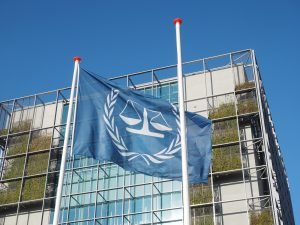Yesterday, a report emerged that Myanmar’s military junta has ordered its judicial system to refuse any notifications issued by international courts seeking to prosecute senior members of the coup government. The news was broken by the local media outlet Myanmar Now yesterday, citing a leaked memo penned by Tun Tun Oo, a former general who has been appointed the junta’s chief justice.
According to Myanmar Now, the order, issued earlier this week, instructs staff to ignore any warrant or summons sent by the International Criminal Court (ICC), which in 2019 opened a case against regime leaders for genocide in connection with the army’s treatment of the Muslim Rohingya minority. It also told officials not to accept any communications from the Argentinian Federal Court, which last month ruled that it could investigate allegations of war crimes committed by the Myanmar military against the country’s Rohingya minority, following a request from the United Kingdom-based Burmese Rohingya Organisation.
Since the February coup, human rights activists and legal advocates have been busily gathering evidence of war crimes and other atrocities committed by the military junta, in the hope that they might provide evidence for future trials. According to the Assistance Association for Political Prisoners, the junta has killed at least 1,382 people since the coup, and is employing increasingly savage tactics in a bid to quash the broad-based and rising armed opposition to the coup.
Earlier this month, the Myanmar Accountability Project (MAP) announced that it had submitted evidence to ICC, accusing coup leader Senior Gen. Min Aung Hlaing, of committing crimes against humanity by ordering the “widespread and systematic use of torture.” According to the MAP’s Director Chris Gunness, “The prospects of a conviction are good and we believe that grounds for issuing an arrest warrant against Min Aung Hlaing are overwhelming.”
The coup has also added impetus to long-standing efforts to bring the military top brass to justice for a range of violent atrocities committed across the decades. According to the advocacy group Fortify Rights, the Myanmar armed forces have “forcibly displaced millions of ethnic civilians, razed thousands of ethnic villages, and raped, tortured, killed, and imprisoned untold numbers of people, young and old.” It is also responsible “for committing genocide and crimes against humanity” against Rohingya Muslims in western Myanmar during a series of brutal “clearance operations” in 2016 and 2017.
Such efforts have received the backing of the country’s opposition National Unity Government (NUG), which brings together ousted members of the National League for Democracy (NLD) administration with ethnic minority and civil society representatives. In August, the NUG announced that it had lodged a declaration with the ICC accepting the court’s jurisdiction with respect to all international crimes in Myanmar since 2002. (This came despite the NLD administration’s previous rejection of the ICC’s decision to investigate genocide charges against Myanmar’s military and civilian leaders.)
Previously, since Myanmar was not a party to the agreement, the ICC was restricted to investigating crimes against the Rohingya carried out on the territory of Bangladesh, which is a state party to the Rome Statue that established the court.
In shining a light on the military regime’s internal communications regarding possible international prosecutions, the Myanmar Now report helps illuminate the junta’s views of such efforts, and possibly offers hints of senior leaders’ fear that they might end up on the stand.
But by revealing the junta’s unsurprising opposition to international prosecutions, it also raises a much-contested question that often lurks behind such efforts: whether the threat of prosecutions, either at the ICC or in another international venue, are more or less likely to force repressive leaders or governments to turn away from their chosen path.
While these advancing criminal cases open up the prospect of long-delayed justice for the Myanmar military’s countless victims, it seems as like as not that the sense of siege produced by the ongoing proceedings will lead the military to redouble its efforts to prevail, whatever the human cost.

































